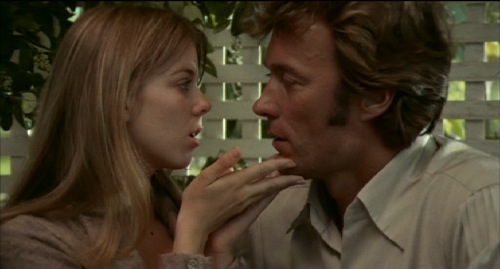As part of my effort to clear my DVR during the COVID-19 pandemic, I watched Luchino Visconti’s “Le Notti Bianche” (“White Nights”) last night. My DVR has quite a few films I’ve seen only once or twice and want to revisit, and this was one of them. Visconti is one of my favorite Italian directors (“The Leopard,” “Rocco and His Brothers”). I don’t recall when I originally saw “Le Notti Bianche,” but I recorded it to rewatch in 2017! Better late than never.
Perhaps I was waiting because it is a sad love story, something best to avoid when one is single. But I didn’t remember quite how sad it is. Marcello Mastroianni stars as a lonely, blue collar guy who through modern eyes happens to look like the most dashing man ever as he walks along the canals of his small Italian town each night.
His name is Mario, and despite looking like Marcello Mastroianni, he is a sad-sack. He can’t even get a stray dog to befriend him at the beginning of the film. The same goes for a crying woman he encounters on one of his nightly sojourns. Her name is Natalia. Played by Maria Schell, she tries to shake him off, but he insists on trying to help her because he has somehow fallen in love with her at first sight. Her tears remain a mystery on that first night, as do her attempts to evade him. But eventually she reveals to him that besides the obvious — a thwarted love affair — her love has kept her waiting for a year for him to return to her.
Mario understandably finds Natalia’s vigil absurd and tells her so. How could she wait around for this man who has surely abandoned her, surely did not truly love her? And he is determined to woo her until she realizes she should transfer her affections to him. Yet his advances seem almost as foolish as her commitment to her long absent lover.
Although darkness abounds throughout the film, there is revelling, including some rather awkward dancing to classic rock ‘n roll tunes, and romance as well as solid comedy in the scenes at Mario’s boarding house with his loud, pushy and loquacious landlady.
All through the movie I thought about how there could be no happy ending. His happiness to win her heart would come at the price of her giving up her dream of her lost love, or her happiness to be reunited with her lost love would mean his despair at losing her. And yet somehow I was surprised to learn that the plot is based on a Dostoyevsky short story. Of course it is.
Still, I am glad I revisited the movie just as Mario is glad to have experienced his love for Natalia — however brief, it was a worthy experience. We must take our moments of happiness when they are offered, whether in a small Italian town in the 1950s or a major U.S. city during a pandemic in 2020.



